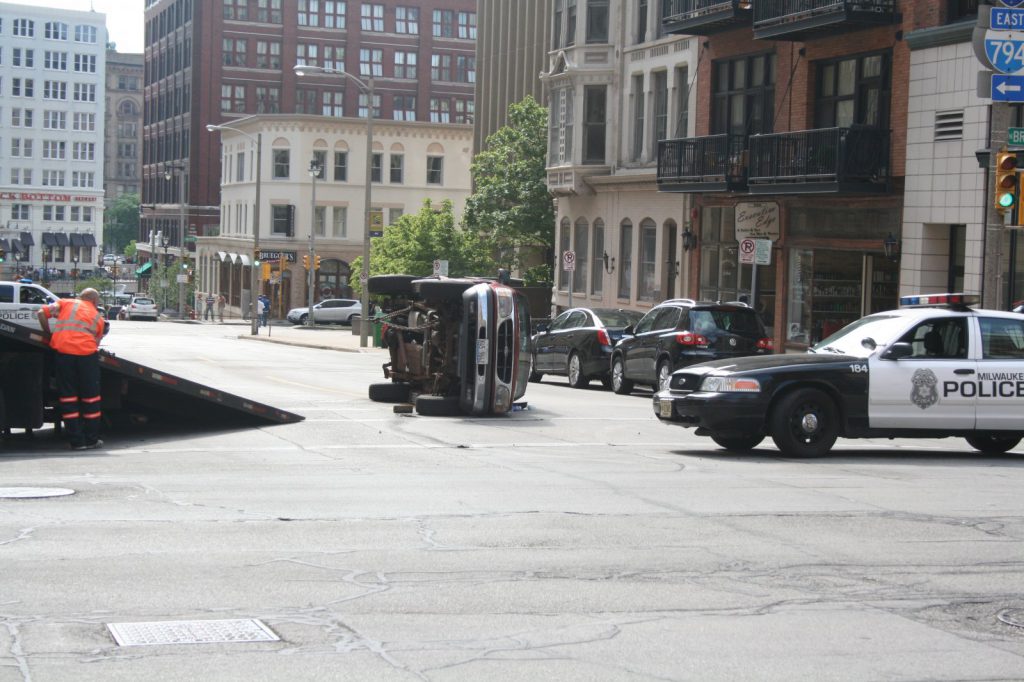The Science of Dangerous Driving
All the city news you can use.
Every day at The Overhead Wire we sort through over 1,500 news items about cities and share the best ones with our email list. At the end of the week, we take some of the most popular stories and share them with Urban Milwaukee readers. They are national (or international) links, sometimes entertaining and sometimes absurd, but hopefully useful.
Centering pedestrian dignity: Anyone who has been on a busy street with cars speeding by knows what it’s like to feel unsafe. In order to combat this feeling, a movement called “pedestrian dignity” is asking for more human centered design that supports transportation by foot. Jonothan Stalls, founder of the organization that started the pedestrian dignity campaign, says people are “worthy of health and connection and safety and love — all these basic needs.” (Chase DiBenedetto | Mashable)
Americans believe suburbs are greener than cities: After a tweet that basically claimed rural areas were more environmentally friendly places to live than cities because they have more trees and open space, YouGov decided to survey Americans about their beliefs on density and environmental friendliness. An online survey of 1,000 people by YouGov found that 75% of respondents believe that living in a suburban area is more environmentally friendly than an urban one, even though experts know that cities are more energy and water efficient. (Taylor Orth | YouGov)
The science of reckless driving: Research has found that low cortisol levels, which indicate a lower stress level, are a risk factor related to reckless driving. This lower cortisol stress response (CSR) showed up in multiple studies of risky driving and the findings hopefully can be used to create intervention programs to reduce dangerous choices. (Emilie Le Beau Lucchesi | Discover Magazine)
Climate change isn’t responsible for everything: Climate change is a massive global issue that impacts many facets of life. But blaming climate change for every disaster takes away from opportunities to build local resilience and mitigate potential threats from situations such as droughts and flooding. It also allows politicians to send aid and spend money on solutions that are for one time only rather than long term solutions. (Friederike Otto | Knowable Magazine)
Quote of the Week
Predictions are difficult. Even experts are really bad at making them, and doing so in a fast-moving crisis is bound to lead to some monumental errors. But we can learn from past failures. And even if only some of these miscalculations were avoidable, all of them are instructive.
–Jerusalem Demsas in The Atlantic discussing why so many predictions about the pandemic were wrong.
This week on the podcast, Aidil Ortiz, principal at Aidilisms, and Mary Kate Morookian, a transit planner at Kimley Horn, speak one-on-one about the Durham Transit Plan and how they approached public engagement.
Want more links to read? Visit The Overhead Wire and signup.
Urban Reads
-
Congestion Pricing Cuts Air Pollution in New York City
 Dec 14th, 2025 by Jeff Wood
Dec 14th, 2025 by Jeff Wood
-
We Think We Love to Drive. But Do We Really?
 Dec 7th, 2025 by Jeff Wood
Dec 7th, 2025 by Jeff Wood
-
Can Scott Wiener Tackle America’s Housing Crisis?
 Nov 23rd, 2025 by Jeff Wood
Nov 23rd, 2025 by Jeff Wood






















